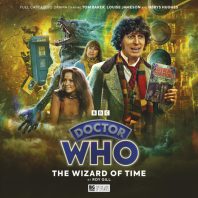
Released June 2023
SOME SPOILERS FOLLOW
Doctor Who as a fictional franchise is one that has deftly incorporated global, local, and personal histories to tremendous effect from the very start. Yet in Roy Gill’s ‘The Wizard of Time,’ famed children’s author Jacob Harmer is finally willing to speak about his adventures with the Doctor, Leela, and Margaret that served as so much inspiration for his beloved stories.
Narrating through an author previously caught up in the adventure of the Doctor and his friends evading a pursuing force from the vortex with the resulting incongruencies in time and topography is an inspired choice, albeit one that results in a somewhat less in-depth overall narrative than might otherwise be the case. Still, Ronald Pickup is tremendous as the elder Jacob Harmer as he injects hitherto unknown truths about his life into his interview with Moira Tenaka whom Sara Powell portrays as so confident and assured. The discussions about the intermingling of fact and fiction as well as of the power of inspiration from witnessed events and figures are compelling, and with Joe Jameson deftly portraying the younger Harmer in the flashback sequences, Gill manages to convey the wide-eyed wonder of youth and the enduring influence and resonance of the Doctor even when met so briefly through the years.
The downside to the focus on Harmer recounting his own history and the foundation for his stories, of course, is that the Doctor, Leela, and Margaret each feature comparatively less throughout this story. Given that this is allegedly Margaret’s last series of adventures after joining the Doctor such a short time ago, this narrative style is something of a particularly odd choice with her present. As always, Tom Baker, Louise Jameson, and Nerys Hughes give wholly engaging performances that capture their easy chemistry and that wholly convey the danger of the pursuing threat and what may happen should the TARDIS fall into the wrong hands, but telling this tale through the shorter segments of Jacob’s direct interactions and resulting memories does mean that the threat loses a little of its immediacy and tension. Gill does try to lessen that potential shortcoming somewhat by showing how Harmer has incidentally become a target for the alien pursuers as well as he attempts to go through his daily life and find a publisher for his tales, but this still does not fully manage to overcome the many lengthy absences of the lead trio.
Whether any particular listener finds the pros or cons of this narrative style more dominant, the incredibly visual method the Doctor employs to keep the TARDIS hidden from his pursuers is immense and brings forth the dimensional element of the capsule whose exterior is so rarely a focus except when explicitly contrasting to the vast interior. This also feeds into the rather lengthy nature of the Doctor’s ultimate plan that Harmer has agreed to dedicate so much of his time to, and the resulting twist behind just why Harmer has chosen to reveal his own true history at this particular moment is quite satisfying as another very visual element bursts forth. The actual conclusion itself is fairly rushed and again gives a somewhat disjointed feeling that even Leela appears to intimate as she continues to meet Harmer at increasingly older ages, but the unique narrative style and focus as well as the undoubted influence of these travelers present plenty of enjoyable and emotional moments along the way to make for an engaging and snappy two-part opener to the Angels and Demons box set.
- Release Date: 6/2023
- Directed by: Nicholas Briggs
- Written by: Roy Gill


Leave a Reply